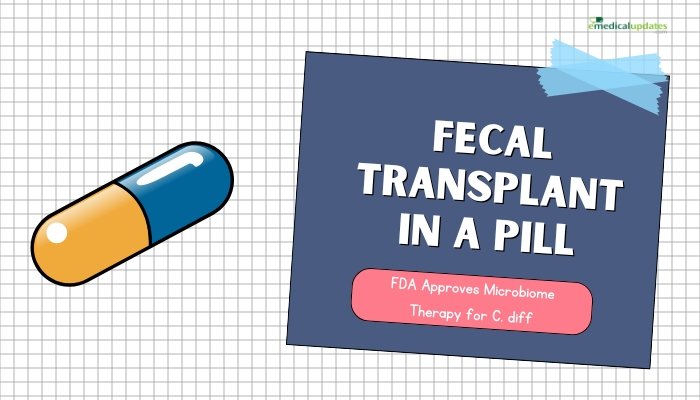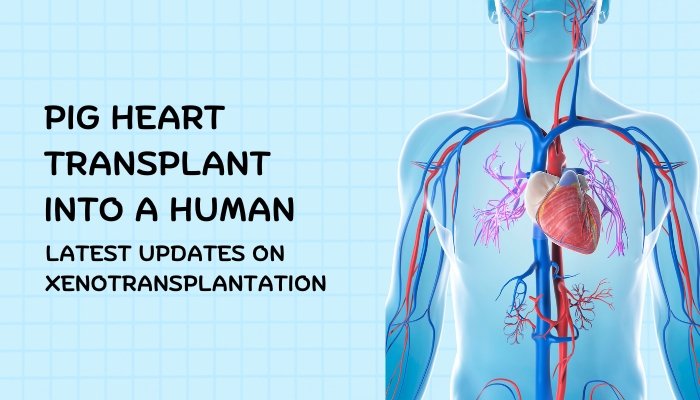Introduction
Clostridioides difficile (C. diff) is a stubborn bacterium that causes severe diarrhea and life-threatening inflammation of the colon. Recurrent infections often plague patients despite multiple rounds of antibiotics, creating a vicious cycle that undermines quality of life.
Fecal microbiota transplantation (FMT) has become a proven strategy to restore healthy gut flora and stop the recurrence of C. diff infection. Traditionally, FMT required colonoscopy or enemas—or at least carefully prepared capsules.
Now, for the first time, the U.S. Food and Drug Administration (FDA) has approved a standardized “fecal transplant in a pill” that simplifies treatment, offering a more consistent and accessible approach to preventing recurrent C. diff.
This article outlines how oral microbiome therapy works, the significance of FDA approval, and what it means for patients who battle recurrent C. diff infections.
Why C. diff Is So Difficult
The Recurrence Problem
- Antibiotics: Standard antibiotics can kill the active C. diff bacteria but also disrupt normal gut flora. Many patients see the infection return once antibiotics end.
- Resistant Spores: C. diff forms resilient spores that survive on surfaces or in the gut, ready to flare up again.
- Repeated Hospital Visits: Recurrence leads to extended antibiotic courses, hospital stays, and higher healthcare costs.
Fecal Microbiota Restoration
The key to preventing recurrence is to reintroduce beneficial bacteria that outcompete C. diff and restore balance in the colon. Fecal microbiota transplantation (FMT) essentially transplants healthy gut flora from a screened donor into the patient’s colon, usually via colonoscopy, nasogastric tube, or rectal enema. While effective (often >80% success in stopping recurrence), these procedures can be invasive or logistically challenging.
The New Oral Microbiome Therapy
Origins and Development
For the newly approved oral therapy, scientists collect donor stool from rigorously screened individuals, isolate beneficial microbes, and process them into capsules. The resulting product—sometimes referred to by brand names such as Vowst (SER-109)—delivers a concentrated dose of bacterial spores straight to the patient’s gut. Unlike older methods, no invasive endoscopy or enema is needed.
How It Works
- High-Potency Bacterial Spores: The capsules survive stomach acid and reach the intestine intact.
- Colonization and Competition: In the colon, these healthy bacteria repopulate the gut.
- Reduced Recurrence: With beneficial flora reestablished, C. diff finds less opportunity to proliferate.
In clinical trials, this approach significantly reduced recurrence risk compared to standard antibiotic treatment alone.
FDA Approval and Clinical Evidence
Clinical Trials
Large multicenter studies demonstrated that patients receiving oral microbiome therapy after completing antibiotic treatment had much lower relapse rates. Over half of participants avoided further C. diff episodes, whereas those relying on antibiotics alone had notably higher recurrence.
Key Benefits
- Non-Invasive: A simple oral regimen eliminates the need for colonoscopy-based FMT in many cases.
- Standardized Dosing: Each capsule contains a consistent concentration of microbes, ensuring uniform quality.
- Convenience: Easier to store and transport, potentially broadening access to advanced FMT-like therapy.
Safety and Adverse Events
Most reported side effects included mild GI symptoms—like bloating or discomfort—and were typically short-lived. As with any therapy derived from human stool, thorough donor screening and processing protocols are critical to minimize infection risks.
Implications for Patients and Providers
A Shift in C. diff Management
Patients with recurrent C. diff often fear relapse the moment antibiotics end. An oral FMT capsule offers a new prophylactic tool, potentially sparing them from repeated antibiotic cycles and hospital readmissions. For physicians, it streamlines prescribing and administration, making advanced FMT-based therapy more scalable.
Integration with Standard Care
- Timing: The capsules are typically given after an antibiotic course that temporarily suppresses active C. diff.
- Patient Selection: Adults with recurrent infections (often 2 or more episodes) benefit most.
- Follow-Up: Clinicians monitor stool frequency and any GI symptoms, ensuring effective colonization and no new infections.
Accessibility and Cost
While exact pricing and insurance coverage vary, some payers may recognize the cost-saving potential by reducing hospital stays and subsequent antibiotic use. Pharma companies might also provide patient-assistance programs to expand availability.
Future Directions
Expanding Indications
Early success in C. diff sets the stage for investigating oral FMT therapy for:
- Inflammatory Bowel Diseases (IBD) like Crohn’s or ulcerative colitis.
- Antibiotic-Associated Diarrhea beyond C. diff.
- Metabolic Disorders: Preliminary research links gut dysbiosis to obesity, type 2 diabetes.
Refining Formulations
Scientists continue to refine which strains or spore types yield the best outcomes. Genetic sequencing of donor samples and personalized microbiome blends might further boost efficacy, reliability, and safety.
New Microbiome Therapies
Additional microbiome-based interventions—like next-generation probiotics and phage therapy—add complexity to this evolving field. The success of an FDA-approved pill for C. diff underscores the broader potential for harnessing beneficial microbes in medicine.
Frequently Asked Questions
- Is this pill suitable for first-time C. diff infections?
- Currently, it’s indicated for reducing recurrence after standard antibiotic therapy in adults with a history of multiple C. diff episodes, not for initial infections.
- Does it fully cure C. diff?
- It significantly lowers recurrence risk but doesn’t guarantee a “cure” on its own. Patients should follow doctor’s advice on antibiotic courses and supportive measures.
- How does it differ from older fecal transplant methods?
- Traditional FMT involves direct stool instillation via colonoscopy or enema. This pill is a standardized, encapsulated product that’s orally ingested, making it less invasive.
- Are there side effects?
- Mild GI effects like bloating or gas may occur. Serious risks are minimized by rigorous donor screening and GMP-level processing.
- Will insurance cover it?
- Coverage depends on health plans and location. Many payers see the cost-benefit in preventing recurrent C. diff hospitalizations. Check with your provider.
Conclusion
The FDA’s approval of an oral microbiome therapy for recurrent C. difficile infections signals a watershed moment, transforming the once-quirky concept of fecal transplants into a standardized, easily administered pill. By restoring healthy gut flora, this new approach helps break the cycle of relapse and repeated antibiotics, improving patient quality of life. With further research, oral FMT-based solutions could extend to other gut-related conditions, heralding a future where harnessing beneficial microbes is a mainstay in infection control and digestive health.
As you weigh options for recurrent C. diff, it’s essential to coordinate with a healthcare provider experienced in microbiome therapy. While this pill won’t replace good infection control practices and antibiotic stewardship, it offers renewed hope for a durable solution to a long-standing problem—one that has proven daunting for clinicians and patients alike.
References
-
- FDA Press Release (2023). “FDA Approves First Orally Administered Fecal Microbiota Product for Preventing Recurrent Clostridioides difficile Infection.”
-
- Guh AY, et al. (2021). “Update on Clostridioides difficile infection epidemiology.” Clinical Infectious Diseases.
-
- Khanna S, et al. (2022). “Oral fecal microbiota transplant capsules for recurrent C. diff: A randomized trial.” JAMA.
-
- Mullish BH, Quraishi MN, Segal JP. (2020). “The microbiome in C. difficile infection: from pathophysiology to therapy.” Nature Reviews Gastroenterology & Hepatology.



